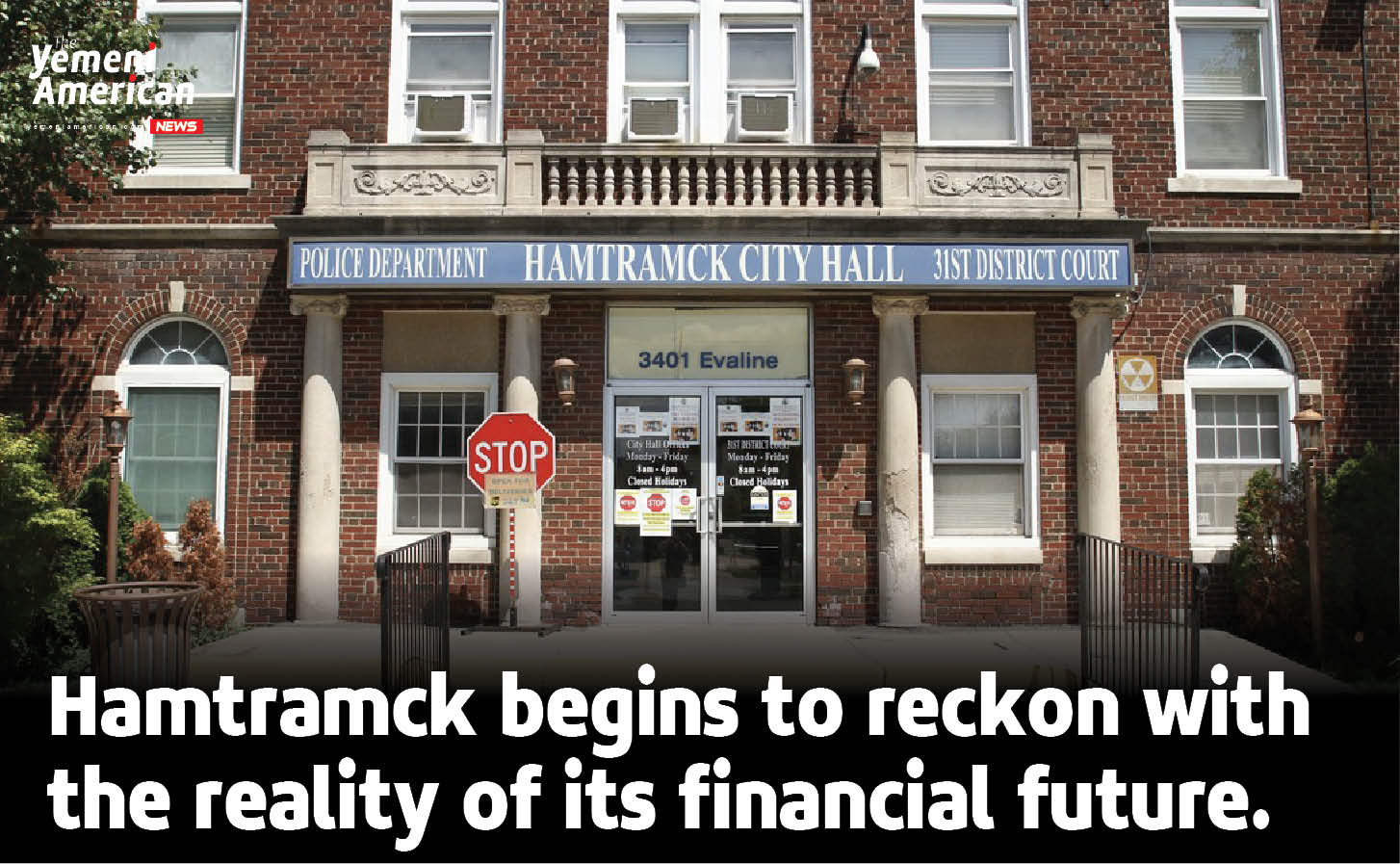CORRECTION: An earlier version of this story counted the City of Hamtramck’s contribution to the Municipal Employee’s Retirement System of Michigan as directly paying for retiree’s healthcare. The current article reflects the correct expense.
By Simon Albaugh – Yemeni American News
HAMTRAMCK, Mich. – Yesterday, the Hamtramck City Council convened for its first work meeting about the budget crisis in the city. The outlook was bleak, with a projected loss of over $15 million over the next seven years. But long before that, explains Brian Camiller of Plante Moran, “you would actually run out of cash.”
Two representatives from financial giant Plante Moran, Brian Camiller and Kari Shea, explained the dire situation for Hamtramck. The city may not be able to pay for city services for its residents. At current projections, explains Camiller, the city will enter a deficit by 2023, meaning that the general fund balance is down to nothing.
“Based on the current forecasts that we’ve been discussing, you will enter a deficit situation in 2023,” Camiller says. “That’s not that far away. You’re talking about the fiscal year budget for 2022… You would actually run out of cash somewhere around fiscal year 2024. So something has to be done.”
At the root of Hamtramck’s financial worries is the cost of their contribution to the Municipal Employee’s Retirement System. People who worked for the city in the 1950s and 60s who have retired were offered retirement packages, without accounting for the growing length of life. Now, the city is struggling to keep up with the bills that started more than 50 years ago.
As bleak as this may sound, the financial representatives outlined two options for City Council to consider. Although the options would fix many problems for the city, both have been shown to be wildly unpopular with residents.
What Choice Does City Council Have?
Plante Moran outlined three viable options for the City to consider. The first is a millage under Public Act 345 that would allow the city to raise taxes in order to fund the expensive retiree healthcare. As many City Councilmembers pointed out throughout the meeting, this has been tried before.
Last year August, City of Hamtramck voters struck down the proposed millage, that would raise taxes in order to fund the millions needed for the retiree healthcare system. The proposal lost by about 70% of votes.
Getting the public’s support on something like this again would be difficult, as many city councilmembers pointed out. But the alternative, is to allow the city to go broke and wait for a court to introduce a judgement levy – an increase in taxes for an entire municipality.
The other option outlined for the city was to cut costs, and Plante Moran’s suggestion was to cut labor costs by removing 27-40 people from the city’s payroll.
“Most departments that aren’t public safety, they have one or two full time employees,” Camiller said. “You can’t run a department with less than that… So the majority of the cuts would have to come from police, and or fire.”
These, according to Plante Moran, were the most viable decisions for the City Council to be able to afford the $3.2 million annual budget for retiree healthcare. According to City Manager Kathy Angerer, this is not something that can be renegotiated or phased out of the cost of running the city, since Hamtramck is “Constitutionally Mandated” to provide this insurance for its retirees.
“Conclusion:,” reads a powerpoint that was a part of Plante Moran’s presentation. “Financially significant, difficult and probably painful decisions will need to be made in order to preserve services delivered to the residents of the city.”
What Went Wrong?
Toward the end of the Budget Work Meeting, Councilman Al-Marsoumi asked the representatives from Plante Moran how the city screwed up. “I know I’m not the only city councilmember who watched this wondering, what went bad?” Al-Marsoumi said. “Other than GM closing, other than the prison closing, what went bad along the way that put us in this position that we’re in today?”
Plante Moran didn’t have an answer younger than 50 years. The fact of the matter, says Camiller, is that the mistakes made happened so long ago that no one who attended the meeting could be at fault.
“The answer to [Al-Marsoumi’s] question is the same answer as many or most of the cities in metro Detroit who’ve gotten themselves into trouble in the last 20 years,” Camiller said. “The benefits that were promised 50, 60 years ago, these plans were started back then, and at the time they were affordable. But as people live longer, the draw of those benefits once people retire became longer and longer. It became a system that wasn’t sustainable.”












